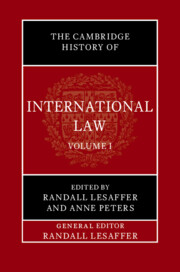Website of the European Society of International Law's Interest Group on the History of International Law.
ESIL Interest Group History of International Law

Wednesday, 28 August 2024
CALL FOR APPLICATIONS: Colonial Legacies in Public Law: histories, theories, pitfalls and potentials (Queen Mary Centre for Law and Society in a Global Context, 14-16 January 2025, DEADLINE: 20 September 2024)
Saturday, 17 August 2024
BOOK: Christopher MEISSNER, "One From the Many: The Global Economy Since 1850" (OUP, 2024)
| Source: OUP |
More info with OUP.
Thursday, 25 July 2024
JOURNAL: Journal of the History of International Law/Revue d'histoire du droit international XXVI (Volume 26/2, 2024)
Description:
A New History for Human Rights: Conflict of Laws as Adjacent Possibility (León Castellanos-Jankiewicz) [OPEN ACCESS]
Abstract:
The pivotal contributions of private international law to the conceptual emergence of international human rights law have been largely ignored. Using the idea of adjacent possibility as a theoretical metaphor, this article shows that conflict of laws analysis and technique enabled the articulation of human rights universalism. The nineteenth-century epistemic practice of private international law was a key arena where the claims of individuals were incrementally cast as being spatially independent from their state of nationality before rights universalism became mainstream. Conflict of laws was thus a vital combinatorial ingredient contributing to the dislocation of rights from territory that underwrites international human rights today.
International Lawyers as Hope Mongers: How Did We Come to Believe That Democracy Was Here to Stay? (Işıl Aral)
DOI 10.1163/15718050-bja10098
Abstract:
It is common these days to lament the recession of democracy around the world. The way scholars address the issue of democratic backsliding shows that there is a significant gap between the expectation about democracy’s anticipated course of development and the current state of affairs. This article argues that the expectation that democracy would consolidate over time was produced by the progress narrative of democratic governance discourses. Drawing on narratology, it conducts a discourse analysis to demonstrate that today’s dismay about the recession of democracy is due to an unwarranted expectation that was created by the progress narrative of democratic governance discourses. It focuses on the periodisation of history in the construction of these discourses and investigates how scholars used the Cold War – post-Cold War dichotomy to create a progress narrative.
The Twilight of the Law of the Fairs: Inventing International Cooperation on Bankruptcies in Early Modern Europe (Lyon, 1660–1710) (Benoît Saint-Cast)
DOI 10.1163/15718050-bja10094
Abstract:
Bankruptcy was a key institution in the development of markets in Europe. However, the territoriality of jurisdictions and legal systems made international insolvencies difficult to manage. In the middle of the seventeenth century, cities such as Lyon developed networks of cooperation by granting foreign merchants equal rights to local creditors on a reciprocal basis. However, courts were reluctant to give foreign authorities control over assets and creditors on their territory. The article examines how the Lyon commercial court changed its policy towards international insolvencies during the second half of the seventeenth century. Whereas equal treatment of foreign creditors was conditioned on the recognition of an extraterritorial jurisdiction in the medieval fairs system, it now depended on the reciprocity of the legal status granted to merchants abroad. This system of cooperation between equally sovereign courts prefigured in many ways the current situation of private international law in bankruptcy matters.
Book review
The Political Economy of International Commodity Cartels: An Economic History of the European Timber Trade in the 1930s , written by Elina Kuorelahti (Florenz Volkaert)
DOI 10.1163/15718050-bja10108
Check out the full issue on Brill's website here.
Thursday, 18 July 2024
BOOK: Anthony LANG & Antjie WIENER (eds.), "Handbook on Global Constitutionalism" (2nd edition, Edward Elgar, 2024)
 |
| Source: Elgar |
Description:
Table of contents:
Preface and acknowledgments xvii
Wednesday, 17 July 2024
BOOK: Marco ROSCINI, "International Law and the Principle of Non-Intervention: History, Theory and Interactions with Other Principles" (Oxford University Press, 2024)
 |
| Source: OUP |
See OUP for more info.
Tuesday, 9 July 2024
CONFERENCE PROGRAM: 19th ESIL Annual Conference, IG History of International Law Pre-conference Workshop, "Historical Perspectives on Technological Change and International Law" (4 September, 2024, Vilnius)

2024 ESIL Annual Conference Technological
Change and International Law
Pre-Conference
Workshop:
Historical
Perspectives on Technological
Change and International Law
Wednesday 4th September 2024, 15.45-18.45,
Vilnius
Centuries
have witnessed the inexorable march of technological innovation, each stride
leaving an indelible mark on the canvas of international law. History is rife
with examples illustrating the intricate interplay between technology and
international law, with new
disciplines emerged, and old doctrines disappeared. This year, our
speakers from two panels will discuss the way and way different disciplines of international
law dealt with technological changes in various historical periods to shed
light on the future.
Programme
|
15:45
– 16:00 |
Introduction
and words of welcome (Jaanika Erne) |
|
16:00
– 16:45 |
Panel
1: Technological changes in the history of the law of the sea |
|
|
Zhaoran Lin (Peking University): Unmanned Maritime Vehicles and the
Changing Law of Naval Warfare: A Historical Perspective |
|
|
Stefano Cattelan (Vrije Universiteit Brussel): Visualising, exploring, and
claiming the oceans: cartography and nautical technology in an age of
transition (c. 15th-16th centuries) |
|
|
Moderator: Sze Hong Lam (Leiden University) |
|
16:45-17:00 |
Questions & Answers |
|
17:00-17:15 |
Break |
|
17:15-18:15 |
Panel
2: Technological changes since the 1920s |
|
|
María Belén Paoletta (Georgetown University) & Iván Levy (Columbia University): Tech-Fueled Aspects on State Responsibility |
|
|
Aathira
Raju (Central University of Kerala): The Impact of the Industrial
Revolution on Colonial Labour- A Critique |
|
|
Dénes Legeza (University of Szeged): The Impact of Sound Recording on International Copyright Law |
|
|
Moderator: Anastasia Hammerschmied (University of Vienna) |
|
18:15:18:30 |
Questions & Answers |
|
18:30-18:45 |
Conclusive
remarks (Jaanika Erne) |
Convenors
Anastasia
Hammerschmied – Florenz Volkaert - Jaanika Erne – Sze Hong Lam (Ocean)
